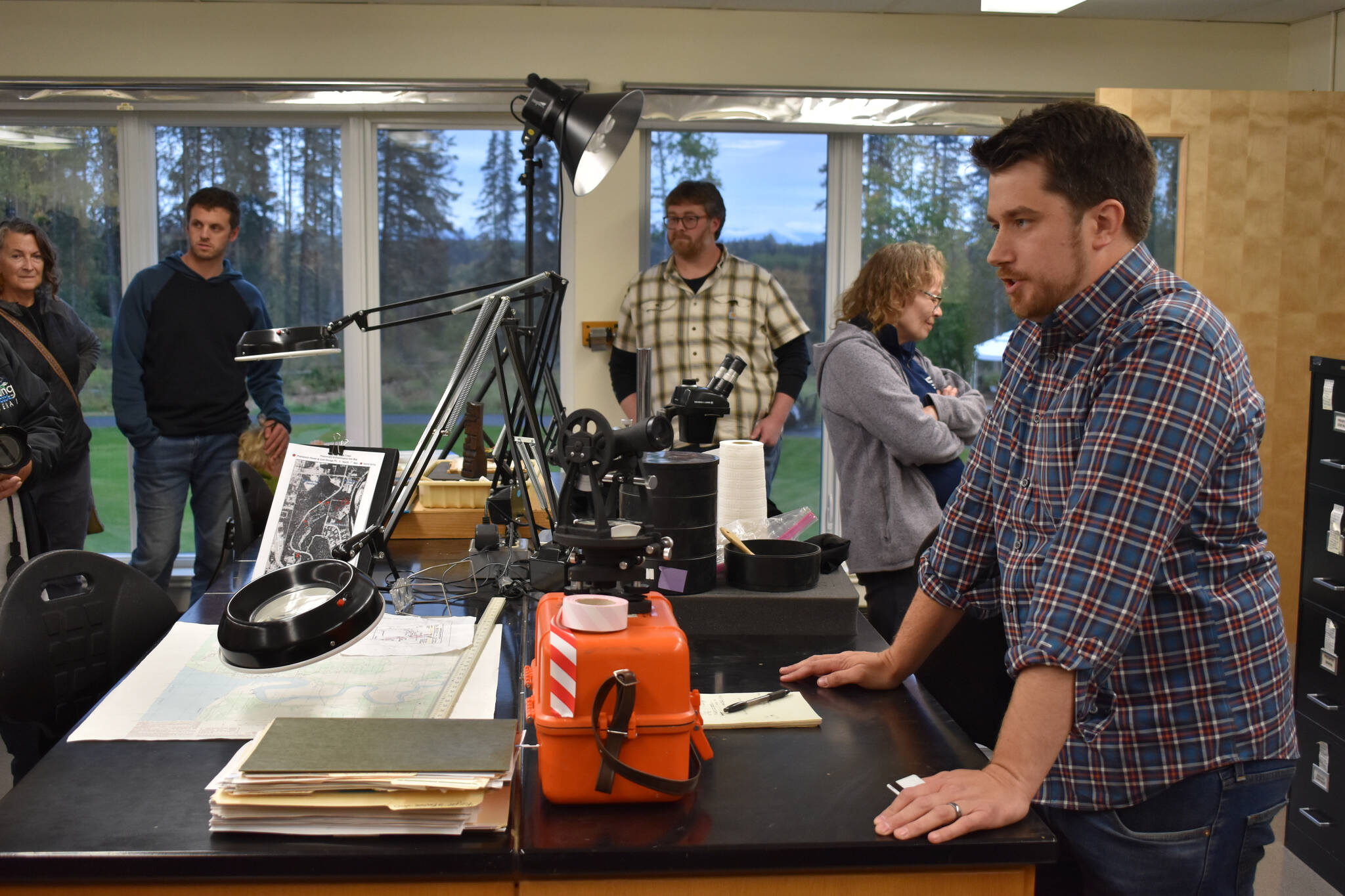“Lives like Alan’s don’t end. They’ve left behind fires that will light other fires that will continue to light fires.”
That’s what Assistant Anthropology Professor Dr. Adam Dunstan said of his predecessor, Dr. Alan Boraas, as the Kenai Peninsula College Anthropology Lab was formally dedicated as the Alan “Tiqutsex” Boraas Anthropology Lab.
The dedication ceremony, held Friday night, was attended by a small gathering of KPC faculty, representatives of the Kenaitze Indian Tribe and the Dena’ina Language Institute, members of the public and Boraas’ wife, Penny McClain.
Beginning in the auditorium of KPC’s Ward Building, a short list of speakers spoke of the importance of the late anthropologist. These included Director Cheryl Siemers; Assistant Professor of Alaska Native Studies Sondra Shaginoff-Stuart; Adjunct Joel Isaak; McClain; Interim Director for Academic Affairs Scott Downing; and Dunstan.
A common thread during the speeches was that Boraas always had time for everyone. Shaginoff-Stuart, Isaak and Downing all said that they would pop into his office for a “quick question” or a “quick chat,” and find themselves still talking minutes or hours later.
“I don’t think of all those times I ever had a moment where he said I have to get to class or I have to prepare for something,” Downing said.
This extended the other way, as Downing said that Boraas was always asking other members of faculty how things were going, how the students were doing.
“He, in many ways, just really embodies KPC,” Downing said. “I really think he’s still a part of this faculty. We may not know how, exactly, but he is going to influence us for a long time to come.”
McClain described Boraas’ dedication to KPC: “This is his second home, but actually I think it was his first.” She said Boraas would spend parts of Christmas and summer vacations still on campus working on projects.
McClain would later spread a small portion of Boraas’ ashes on the grounds with Siemer’s blessing.
Much was also said about Boraas’ dedication to the Dena’ina language, with Shaginoff-Stuart describing how she would always call out to him in the Alaska Native language when she passed the anthropology lab, and he would respond in kind. She and Dunstan delivered a greeting in Dena’ina as part of their speeches.
Dunstan said he was an interesting choice for a speaker, because he actually had never met Boraas.
Despite never meeting him, Dunstan still feels as though he has gotten to know Boraas.
“Everywhere I go, everyone has an Alan story,” he said. “And I feel I’ve come to know him by working in his lab. You see his love of this land and his love of the peoples of this land everywhere you go.”
Dunstan described the passion he feels from filing cabinets and books, from “furiously scribbled notes that show he was getting excited about an idea.”
“What I want to tell people and what I want to reassure people is that that work will go on. That this lab will go on as a continuation of what he did. It is a space for the community, it is a space for all of us to connect with each other. To connect with the past, to connect with the present.”
Following the speakers, attendees proceeded upstairs to the lab, where a new plaque identifying the lab was installed at the entryway, alongside a framed photo of its namesake, and a piece of art in his honor by Associate Professor of Art Cambid-J Choy.
Choy said the art was inspired by Boraas’ love of skiing and his reputation as “a trailblazer.”
Then, Dunstan gave a brief tour of the anthropology lab before attendees descended to the university’s back lawn for a fire, where everyone was encouraged to speak and share stories of Boraas.
The lab is equipped for examining text and artifacts, with equipment for magnifying at each of its tables. It’s also stocked with books, files, and a storage space closed to the public for maintaining sensitive relics.
Dunstan said that one of the major projects currently being worked on is a multiyear partnership with the Kenaitze Indian Tribe to interview knowledge holders “about fishing, about the history of fishing and the meaning of fishing.”
He said the department was honored to be invited onto the project by the tribe.
According to previous Clarion reporting, Boraas began teaching at KPC in 1972, becoming a professor of anthropology in 1997 and ultimately spending 46 years at the institution before his death in 2019.
Boraas was also a figure in the community beyond the campus. His work toward preservation of the Dena’ina language led to him being welcomed as an honorary member of the Kenaitze Indian Tribe. The tribe gave him the Dena’ina name Tiqutsex, which translates to “he is breaking trail.”
Boraas was also a driving force behind the creation and expansion of Tsalteshi Ski Trails, where he coached high school cross-country skiing.

